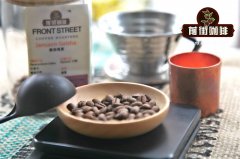What are the planting conditions of Kopi Luwak? introduction to the planting conditions of luwak coffee beans

Professional coffee knowledge exchange more coffee bean information please follow the coffee workshop (Wechat official account cafe_style)
Introduction of Indonesian Musk Coffee in Qianjie
Kopi Luwak is just another name for this coffee, and its official name is "Kopi Luwak". Kopi means "coffee" in Indonesian, and Luwak refers to a wild animal called "civet". The origin of civet coffee can be traced back to the colonial era in Indonesia, when the Dutch government banned local people from eating and roasting coffee in the coffee garden, but accidentally found that the coffee beans discharged by the wild civets after eating in the garden had a completely different taste.
Muscat Coffee (KopiLuwak), Kopi (Indonesian, coffee), Luwak refers to an arboreal wild animal called "civet" by Indonesians.
Kopi Luwak, produced in Indonesia, is one of the most expensive coffee in the world. Indonesia grows a lot of coffee crops, including wild animals called civets, omnivores, pointed mouths and dark gray fur. The favorite food is fresh coffee beans, which are fermented and digested in the body and eventually excreted by cats. Feces are grains of coffee beans and become the most expensive feces in the world. Because the quantity is very rare, so the price is very expensive. Civets are found in Indo-China, India (northeast), Bangladesh, Bhutan, Sikkim, Nepal and Kashmir, but only Sumatran civets, or Indonesian civets, can produce Kopi Luwak.
The civet likes to choose the most mature, sweet, juicy coffee fruit in the coffee tree as food, but only the pulp of the coffee fruit can be digested by the civet, and the hard coffee beans will be excreted from the body.
After the civet eats coffee beans, the coffee beans will ferment and shed their shells in its stomach. coupled with the breakdown of proteins by hormones secreted by its gastric mucosa, the amino acids produced can reduce the original bitter taste of coffee beans. Also because coffee beans cannot be digested, coffee beans become the most valuable ingredient after washing the faeces discharged by civets.
The longer the cat poop coffee beans are stored, the stronger the flavor will be. The coffee brewed by Kopi Luwak is also thicker, and there will be delicate residue at the bottom of the cup after drinking it.
Although Kopi Luwak tastes mellow, today's civets are farmed, and the taste of coffee depends on the quality of the fed coffee fruit. Although the quality of coffee fruit generally has its own characteristics, the quality of Arabica is better than that of Robusta.
END
Important Notice :
前街咖啡 FrontStreet Coffee has moved to new addredd:
FrontStreet Coffee Address: 315,Donghua East Road,GuangZhou
Tel:020 38364473
- Prev

How does the pointed bourbon bake bourbon pointed coffee is decaf?
Professional coffee knowledge exchange more coffee bean information please follow the coffee workshop (Wechat official account cafe_style) in front of the street pointed bourbon coffee roasting sharing I do not know how many people know the name pointed bourbon, but to be sure, know her must be the most knowledgeable coffee enthusiast and coffee connoisseur, former British Prime Minister Winston Churchill, former French President Jacques Chirac, famous writer Ba
- Next

What are the conditions for growing coffee in Yejiaxuefei? introduction to the taste of Yega Xuefei
Professional coffee knowledge exchange more coffee bean information please pay attention to the coffee workshop (Wechat official account cafe_style) front street Yega Ficochel planting conditions, flavor introduction Yega is located in Ethiopia's Sidamo province, 2000 meters above sea level, is one of the highest coffee-producing areas in Ethiopia, the coffee produced here is called Yega Xuefi (yirga chef)
Related
- Beginners will see the "Coffee pull flower" guide!
- What is the difference between ice blog purified milk and ordinary milk coffee?
- Why is the Philippines the largest producer of crops in Liberia?
- For coffee extraction, should the fine powder be retained?
- How does extracted espresso fill pressed powder? How much strength does it take to press the powder?
- How to make jasmine cold extract coffee? Is the jasmine + latte good?
- Will this little toy really make the coffee taste better? How does Lily Drip affect coffee extraction?
- Will the action of slapping the filter cup also affect coffee extraction?
- What's the difference between powder-to-water ratio and powder-to-liquid ratio?
- What is the Ethiopian local species? What does it have to do with Heirloom native species?

